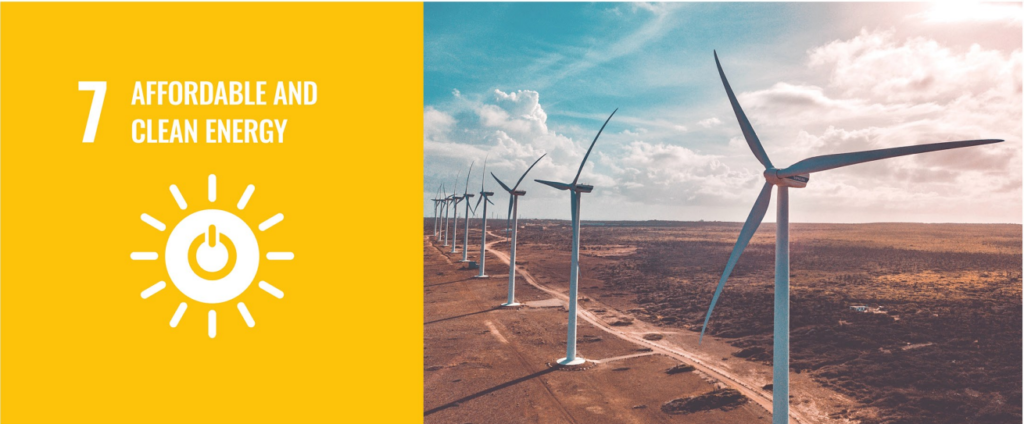

7.1 Spirit of the SDG and the University’s Philosophy
Energy is not only one of the most basic elements of human life, but also represents one of the most significant challenges in the contemporary world. Being able to access and afford energy is of vital importance to the survival and future development of all human beings. A key requirement to ensuring sustainability is using clean energy.
The University is working with industry and the government to promote and develop affordable clean energy. This is achieved by managing energy sustainably on the University’s own campus, as well as energy-related research and teaching, and participating in public policymaking. In terms of overall institutional governance, a multipronged approach is applied that includes policy oaths, education promotion, and the operation of the university to ensure energy conservation and carbon reduction, as well as medium-to-long-term planning and implementation of the use of renewable energy. The purpose is to achieve sustainable management of energy on the campus with both revenue-raising and expenditure-cutting measures. At the community level, the University actively promotes and educates the general public about the importance of energy efficiency and clean energy, to ensure that they have the relevant knowledge. At the national level, through its related research and projects the University integrates the resources of industry, the government, and academia in the energy field, and proactively promotes the bonding and cooperation of all parties, thereby assisting in the construction of a complete ecosystem of sustainable energy development in the country. On the international front, through international research cooperation and links with international organizations, the University participates in and contributes to the promotion of global clean-energy-related research and innovative practices.
7.2 Achievements
Committed to sustainable energy measures and implementing a green campus
The University has improved the sustainable energy management of the campus by reducing the total energy (including electricity) usage and increasing the proportion of renewable energy used. The University is comprehensively improving the energy efficiency of buildings on campus, including by using heat pump systems in the dormitories of teachers and students, and solar hot water in gymnasium. The University also conducts weekly energy waste inspections of the electricity consumption of all units in the University, with any identified instances of improper electricity consumption being addressed immediately. Moreover, to increase the use of renewable energy, various buildings in the University are equipped with solar photovoltaic power generation systems. Some offices in the College of Technology and Engineering have also taken the lead in installing multienergy smart power generation systems, which receive energy from solar panels, hydrogen fuel cells, and reticulated electricity from the city. Some of the office power is provided by this smart power generation system, reducing the need for nonrenewable energy generation and hence also carbon emissions.
Research and teaching innovation to cultivate talent related to the green energy industry
Both the College of Science and the College of Technology and Engineering of the University offer courses related to sustainable and clean energy. There are several academic teams carrying out research related to low-carbon green energy and energy efficiency, using academic professionalism to research and develop cutting-edge technologies in the field of sustainable energy, including into improving its practicality. In addition, through industry–university cooperation programs, such as in the vehicle and energy engineering courses, the University nurtures cutting-edge talent related to the green energy industry, thereby pursuing clean and renewable energy to become truly sustainable as a result of continuous innovation, research, and development, as well as talent cultivation.
Collaboration of teaching resources with industry and the government to promote the country’s sustainable energy development
The University proactively provides sustainable energy education and guidance to different external communities, with the results from several major aspects disseminating widely. In terms of public education, the University assists the government to promote energy education in elementary and high schools across Taiwan, putting into practice a deeply rooted foundation in national energy education, with rich and diverse results. Furthermore, from the industrial perspective, several private enterprises have been carrying out industry–university cooperation projects to help companies to improve energy efficiency and to use clean energy. In addition to reducing environmental pollution, these projects can help in cultivating and strengthening the development of the local green energy industry. Moreover, the University is committed to fostering emerging low-carbon industries and has successfully assisted the University’s research team in setting up a company called NeoPower Technologies Co., Ltd. to enter the electric vehicle and green energy market. Finally, from the public policy perspective, the University undertakes different government projects, verifies relevant policies, performs important preliminary research, and assists the government in cultivating talent in the green energy industry.
7.3 Featured Highlights
7.3.1 Promoting a deeply rooted foundation in national energy education: the “ Energy Education Promotion Program for Primary and Secondary Schools”
Since 2018, the University has been cooperating with the Bureau of Energy, Ministry of Economic Affairs to plan and implement the 3-year “Energy Education Promotion Program for Primary and Secondary Schools”. This program plans and implements systematic energy education courses and teaching materials, involving teachers and students in all elementary and high schools in Taiwan as targets of the promotion. At the same time, multiple activities are held to prompt students across the country to understand energy efficiency from an early age, encouraging them to practice energy saving and carbon reduction in their daily lives. Finally, by integrating units related to industry, the government, and academia, the University cooperates with technical units, the media, humanities and arts institutions, and private institutions to spread energy education from schools to local and external communities, which results in specific major accomplishments in energy education in elementary and high schools everywhere.
Related Media Coverage


7.3.2 Undergraduate Program of Vehicle and Energy Engineering: research and development of innovative technologies, and cultivating cutting-edge green energy talent
The “Undergraduate Program of Vehicle and Energy Engineering” was established in 2017. The program emphasizes technological innovation, industry–university exchanges and cooperation, and through technical exchanges and training it directly assists local industry to further improve their energy efficiency and to utilize clean energy technology. Specific results include assisting well-known local companies to improve the energy efficiency of air-conditioning systems and successfully achieving energy-saving rates of 4–9% for water chillers. The program also offers exchange and internship opportunities to students in different companies, thereby injecting green energy and sustainable energy technology talent into local industries.


